Quote
"The Peace Corps takes optimistic, idealistic Americans, beats all of the idealism out of them, and leaves them with a real desire to just, simply, help."
The experiences of Cait as a Peace Corp Volunteer in South Africa.

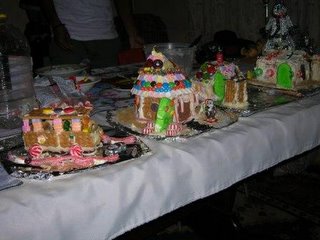
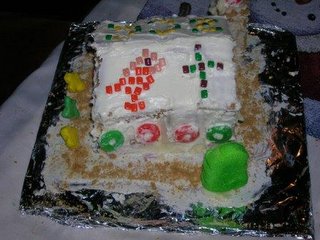




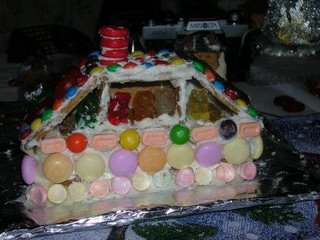
Sometimes things fall so easily in place, and become so naturally comfortable, that you don’t recognize the dynamics that created the situation to begin with. It has taken me until now to realize that the other Peace Corp Volunteers have not only become intimate friends, but more importantly, a substitute family. Together we easily come in union to create the semblance of domestic grace and tranquility.
Spending the last few days with these people further emphasizes this to me. It is the little things I notice when we are together: Mike cooking meat, Hossam chopping onions, Meagan cutting tomatoes while commenting on our charisma in the kitchen, me adding spices and garlic, all to make pasta sauce. After dinner Meagan washes dishes, Hossam rinses, Mike dries while I clean the counter. I find this order and efficiency comforting. The hundred little things, all of us together and content: Hossam napping while Meagan, Mike, and I discuss the best way to hang Christmas decorations or all of us in the bathroom brushing out teeth together while killing cockroaches. Like any good family, we are all very different from each other, but we are all experiencing the same things together, which creates a deeper bond than what any personality differences could harm. If I need advice or comfort or just a good laugh these are the people I go to. They are the ones that complete the experience.
As a result, I am not depressed about spending the holiday season here. I actually am enjoying the combination of traditions that we bring from our former lives. One of the best days I have had here was making ginger bread house in honor of a tradition that Mike’s family celebrates each year. It was great to mix that with being in Africa: Mike made a hut (roundavel) with Santa in front cooking pap, Meagan made a taxi (coombie), Hossam made the ZCC church complete with pigeons and Santa using a pit toilet, and I made a bar (shabeen) complete with a pit toilet with a tin roof. Graham crackers and frosting have never been quite so entertaining before.
In the morning, as Hossam passes me milk to add to our tea, and we sit outside, sipping, talking, while Mike’s puppy jumps at our feet, I feel that I may have found a good “home” for myself for the next 22 months.
Mapula is so unlike many of the other women here. She is always up front and brutally honest about what is on her mind. Though this occasionally causes problems, more often than not it is one of the main reasons I adore her. So I found it unsurprising that, after casually mentioning to her that I wanted to learn how to cook Indian food, she took it upon herself to approach the Indian owner of one of the shops, first berating him for being rude to customers and then asking if his wife would teach me to cook. As a result, today we headed over to the store to meet with the woman.
The Indian couple could not be physically more different. He was robust, filling in his clothes with a large, round, Buddha belly, his face young and jovial complemented with a bushy mustache and full head of thick black hair. She was tiny, barely keeping her baggy blue jeans on her thin frame. Everything about her focused on petite: her tiny feet always moving and tapping, her small, child-like hands with long fingers accented by clean opal nails. Her hair was back in a clip and she continuously tucked loose strands behind her ears. She wore a wind breaker that attempted to add bulk to her but instead simply seemed oversized. She struck me as cute and energetic, a busy mouse, even with the heavy dark circles that accented her eyes. I took them to be a result of her curious and wandering two-year old daughter who was naughtily into everything around the store while her parents took turns dragging her out of various bins and spaces.
I liked her immediately. Her English was excellent with no distinct accent from anywhere. She was outspoken with a personality twice as big as her body. We sat and talked while she intermittently gave me recipes and tips on cooking. Eventually we decided to make one of the dishes: a bean and onion mixture. We sat in the back room of the store, crouched over a crate where an electric stove had been placed, gradually adding various spices she had collected in discarded formula containers. A zesty, comforting aroma quickly filled the space as we cooked. I discovered that she had been living in South Africa for two and a half years. She planned to send her daughter back to India for schooling because she like the education system better there, especially the fact that computers were integrated from an early age. We discussed the differences in life between South Africa and India:
“The people here, they don’t like to walk.”
“My food is too spicy for them.”
“Some of the men here drink a whole liter of soda at one time. I can’t believe it!”
Eventually the food was ready and she offered me bread with my vegetable mix while bubbling:
”I love bread, my husband doesn’t, but I eat a lot of bread.”
She apologized for not having a spoon, but I explained I was used to eating without one. She said defiantly, “In my culture we don’t use spoons. It is said that is what God gave us hand for, but I say God gave us hands so we can use a spoon.”
The meal was delicious, spicy and refreshingly different from the majority of the food I encounter. I was so appreciative. This woman who had never met me had welcomed me, taught me, and generously fed me. I tried to think about the last time something similar had happened to me in America. I couldn’t come up with an example.
As I walked home with Mapula we encountered a young teenager carrying a coke. I jokingly asked for the coke as I am so often asked for all of my things by villagers. The boy said no because “I was white and had oppressed him.” Mapula attempted to explain to him that I was, in fact, not an Afrikaner but an American here to help. His lack of geographical knowledge made it pointless and he was still convinced, in the end, that I had oppressed him.
As I walked away I found the whole situation amusing; here was a child who had been a mere toddler when apartheid ended. He had no real idea of the oppression his parents had experienced, and so often it was his parent’s generation that so immediately accepted me into their community. I saw it as yet another of a multitude of excuses given to why things were the way they were for many of the villagers: always a sense of being stuck at the bottom rung with a million excuses lamenting limitations to move past this placement.
Mapula grudgingly accepted my plea to take a walk into the hills behind our home. I have a desperate need to explore but not the security to set off on my own. After the rains of the week and an extended bout with what the locals refer to as “runny stomach” I was getting antsy trapped in my room, and an intense feeling of “village fever” made me need to find room to breathe. Eventually, pulling Mapula away from a game of cards, she relented on the condition we walk to the graveyard.
I feel redundant always talking about the beauty of my surroundings so I will limit my lamenting to the observation of seeing my village from an entirely new vantage point: just after the rain, from the top of a hill, affording a large panoramic of the dam mirroring the mountains, resting behind it. I gain a whole new appreciation by viewing the area from above.
Upon reaching the graveyard we found the area deserted with the exception of a large brown and white spotted cow complacently munching weeds from the burial sites of so many villagers. The graveyard reminded me of the cast off remnants at the end of a rummage sale: each burial plot had a number of items left for the dead ranging from plastic flowers, coca cola bottles, tin plates, letters, etc. Many of the graves were either unmarked or signaled with plastic crosses printed with black marker: the deceased name and dates of life. A few of the graves had large marble head stones and one even had a red cement bible sculpted open above it. I curiously moved to see the symbolic passage placed above the head stone but the page was blank, perhaps that passage hadn’t been written yet.
As Mapula visited her aunt’s grave I walked through the cemetery reading what tombstones were available. I was struck by how recent so many of them were. Among the dozens of graves not one was more than 10 years old, most less than five, some still so new that the cement over them hadn’t even began to accumulate any type of gray, weathered look.
I found the graveyard to be a good research point to see how afflicted the village population was with disease and other tragedy: most of the dead were younger than my parents, many more barely older than myself. The proclaimed “elder” of those deceased was in her early sixties. It was not a good sign.
I walked to Mapula who was pulling weeds from her aunt’s grave. I joined her, though it struck me as fruitless, since the weeds were abundant and with the multitude of rain I knew they would sprout again tomorrow. Still, I knew it was important to her, this weeding process, this need to feel control over something. I saw myself, my reasons for being here, in the same light: trying to fix a problem much bigger than my ability, knowing that more difficult situations would arise tomorrow, but still needing to feel that I have some control, that I made some small difference.
After, as we walked away, me feeling somber and defeated, Mapula asked:
“Do you still want to walk to the dam?”
“Yes, of course.”
She twisted her face into a displeased grimace and raised her tone as she said:
“Awww….you always want to go to the dam. Dam addict.”
I laughed at her unknowing use of a pun and felt complacent once more.
I adore the rain: the relief from the heat it signals, the methodical beat it emulates from my tin roof, the earthy smell that reminds me of home. Night is my favorite time during a storm: I can look out the window, across the village, and see the obscure beacons of lights mystified by clouds so low that the top of the hills have disappeared into another universe. The stars have been consumed by the clouds but are replaced by the abstracted lights making me feel that I am floating through space.
Rain makes me dreamy and fanciful. I lay in my bed, burritoed in my blanket, and allow my mind to create perfect images and scenarios. I feel safest in the rain, everyone is holed up in their houses allowing me the ability to dream in my room without being judged a hermit or to stand outside, eyes towards the heavens, inviting the drops to attempt to tame my spirit and kiss my skin with their lightness. I can sit in the rain for hours, in another world, another life. The rain makes me wild, makes me thoughtful, adds substance, makes me nostalgic, makes me want to be an artist, a writer, a poet, a dancer. It makes me an oxymoron to myself. I am content.
On my way home from Kgapane is a stretch of road occupied by the “mango women.” It is here that ten women sit with buckets of mangos to sell to the passing cars. If a car does pull up, which seems to be rarely, the women run to the vehicle vying for the buyer. The whole venture seems futile on a number of levels:
Everyone in this area has a mango tree and eats their own fruit.
It would make more sense to me if they would spread along the road in order to not all compete for the same business. I feel like one entrepreneur of the group would move further up the street.
I suppose they enjoy each other’s company and this is just the way things are. My American need for reasoning and efficiency somehow seems naive, unwanted, or simply ridiculous here.
Does it strike anyone else beside me as odd/strange that the nicest shops: brick buildings, painted, tables, grass are the shabeens/taverns. Frankly, I find it discouraging.
I have recently been reading Dark Star Safari: Overland from Cairo to Cape Town by Paul Theroux, which is not only excellent, but has also had the effect of making me change my thought process about being here. I recommend it highly and wanted to include a few of his passages because I think they accurately describe many of the things I have encountered here.
You go to the ends of the earth to begin a new life, and think you have succeeded, and then the past breaks in, as it does to the fugitive in disguise spotted by an old enemy.
He had liked Africa for being the anti-Europe, the anti-west, which it is, sometimes defiantly, sometimes lazily. I liked it for those reasons too, for there was nothing of home here. Being in Africa was like being on a dark star.
I thanked him, and walking out to the main road I reflected on how Africa, being incomplete and so empty, was a place for people to create personal myths and indulge themselves in fantasies of atonement and redemption, melodramas of suffering, of strength- binding up wounds, feeding the hungry, looking after refugees, driving expensive Land Rovers, even living out a whole cosmology of creation and destruction, rewriting the Bible as an African epic of survival.
Tadelle said, “There was a war here in 1983”- no sign of it, though, except for some wrecked vehicles on the low bare hills, The war had come and gone, people had died, life resumed, nothing had changed, still the plow and the herd of goats and the cooking fire and the bare buttocks- the African story.
I was reassured by the fact that the trucks were full of cattle and not people, for in these parts cattle were valuable and people’s lives not worth much at all. Even when tribesman were shot here on this border, no one troubled to file a report. They only said, “The Borena are fighting,” or the Oromo, or the Somalis, or the Shifta. No one knew the body count. If cattle had been slaughtered or rustled, the exact number would have been know and lamented.
He said in English, “They do not want your life, bwana. They want your shoes.” Many times after that, in my meandering through Africa, I mumbled these words, an epitaph of under development, desperation in a single sentence. What use is your life to them? It is nothing. But your shoes- ah they are a different matter. They are worth something, much more than your watch (they had the sun) or your pen (they were illiterate) or your bag (they had nothing to put in it). These were men who needed footwear, for they were forever walking.
“If you do go out at night, you will definitely be robbed,” I was assured. “There is a one hundred percent chance of it. I am one hundred percent sure. Don’t resist, give them what they want, and you will live.”
Women confident enough to walk down the street wearing jewelry was one test of an African city’s safety.
“So what was the answer?” I asked.
He smiled. “Maybe no answer.”
Maybe no answer. The whites, teachers, diplomats, and agents of virtue I met at dinner parties had pretty much the same things on their minds as their counterparts had in the 1960s. They discussed relief projects and scholarships and agricultural schemes, refugee camps, emergency food programs, technical assistance. They were newcomers. They did not realize that for forty years people had been saying the same things, and the result after four decades was a lower standard of living, a higher rate of illiteracy, overpopulation, and much more disease.
Foreigners working for development agencies did not stay long, so they never discovered the full extent of their failure. Africans saw them come and go, which is why Africans were so fatalistic. Maybe no answer, as my friend had said with a rueful smile.
And a feature of every settlement was the sight of African men standing under trees, congregating in the shade. They were not waiting for buses; they were killing time because they had no jobs. [ ] In Kenya, whenever I saw a well formed tree near a village or town, I saw men under it, doing nothing, looking phlegmatic and abstracted.
Leaving Kisumu on the afternoon bus to the border, I saw a booming Kenyan industry: just outside town, shop after shop of woodworkers, all of them making coffins- the freshly cut raw wood, reddish in the dampness, the men sawing it and nailing together the long boxes, everyone hard at work. The finished coffins were stacked or standing upright, lots of them. This was the busiest local industry I had seen in the whole of Kenya: the coffin makers and their lugubrious product, a perfect image for a country that seemed terminally ill.
People on the outside just write bad news- the disasters, Ebola virus, AIDS, bombs. And they ask the wrong questions.
“What should they ask?”
“The questions should be: How did anyone survive?”
“I think I know the answer,” I said. “Because it’s a subsistence economy, and survival is something that Africans have learned.”
Africa was full of skinny energetic children, and their game usually involved kicking a ball. The children did not have a round rubber ball but rather a misshapen cloth ball stuffed with rags. The field was not flat and smooth- it was a succession of dirt piles and lumps, very stony. The children played barefoot, probably twenty or more, not teams but a free-for-all.
Watching them play and call to each other on this hot night, raising dust in the lights of the station yard, I was impressed by their exertion and heartened by their high spirits. They playing field was a wasteland and part of it lay in darkness. The children ran in and out of the shadows screeching. The dark didn’t matter, the bumpy field didn’t matter, nor did the squashed ball. By any reckoning, these children were playing and laughing in one of the more desperate provinces of a semi derelict country.
“It is horrible. There is no sex education. No one will talk about sex, but everyone does it. No one will talk about AIDS and everyone is infected. We were sent an anti-AIDS film and we showed it. But people in the villages said it was shameful-too indecent-and so it was withdrawn. What could we do?”
“Did you talk to them about it?”
“I tried to.”
“And what happened?”
“They wanted to have sex with me.”
“They ask me for money all the time. ‘You give me money’-just me, because I am white.”
In Africa for the first time, I got a glimpse of the pattern my life would take- that it would be dominated by writing and solitariness and risk, and already in my early twenties I tasted those ambiguous pleasures. I had learned what many others had discovered before me- that Africa, for all its perils, represented wilderness and possibility. Not only did I have the freedom to write in Africa, I had something new to write about.
Some of the same people who praised South Africa as the richest and most successful country on the continent said it was also a jungle.
This was the ultimate white South African nightmare, becoming totally dependent on your black servants, reduced to living in a simple remote village.
Nadine had been ruminating. She said, “I didn’t leave. I stayed. I saw everything. The people who left-well, you can’t blame the Africans. Life was awful for them. But the others- the whites, the writers” –she shook her head- “after they left, what did they write?”
Maureen said, “I feel sorry for anyone who left, who missed it. All those years. And it went on for so long- beyond Mandela’s release.”
I said, “Isn’t it still going on?”
“Yes it is. You can write about it,” Nadine said.
“Don't you want to come to our braie?”
I sleepily think: when, where, why, etc. as my brain tries to comprehend who I am talking to on the phone and what exactly is a braie. It's one of my principals and she's referring to the South African equivalent of a bbq. I will never get used to the way a South African villager forms a questions: as if I've already said no and they're trying to convince me otherwise.
“Yes I will come.”
The next day I find myself in a taxi with all the teachers of my key school: I'm sitting not paying much attention to what is being said since I can't decipher the language, when a brake takes place and they convert to English. This is my cue that something involving me is about to occur:
“Makobo, I'm going to buy you something to drink. What would you like?”
“I don't care.”
“Cold drink?”
“Yeah, cold drink is fine.”
“What about a beer?”
“No, I don't drink beer.” (I know this is a lie, but I'm trying to project an image of moral goodness to my colleagues)
“You won't drink a beer?”
“No.”
“Well, you are the only one in the taxi.”
Laughter ensues. Next thing I know my teachers are arguing. The only thing I can pick up from their bickering is it's about sparkling water. I still wonder what it is about sparkling water that could cause such a stir.
The ride progresses. We stop by a store to pick up meat. One of my teachers comes back with a “snack” to hold him over until we eat: fish and chips and hot dog buns. He proceeds to put french fries and fried fish in the folds of a hot dog bun and eat his sandwich. He does this with six hot dog buns. I find this, not only strange, but also surprising as I now expect him to combust. Then again I find many food choices to be extraneous. For example, choosing between french fries and toast to complement your omlette at breakfast seems out there. I have not fully adjusted to South Africa yet.
As we drive out of the parking lot, an Afrikaner girl bends to clean her shoe. Her already low cut pants dip even further exposing half of her rear. I am struck with her need for a belt. Laughter ensues.
Eventually we reach our destination which I discover is called “The Wheelbarrow.” Each time I go to a new place I think to myself: this must be the most beautiful place South Africa has to offer. Yet, each time the beauty only surpasses itself, and I can only think to myself the magnificence of nature.
I think we must have taken a wrong turn somewhere. It looks like Fiji. The place in incredible, I have been transported into a rain forest: there are tropical gardens with giant palm trees. Lacy emerald fronds provide a canopy from the sun and later the rain. Vines tinged yellow and pea soup green climb the muted red brick buildings. Bridges run over small ponds filled with lily pads. Branching from the tree are long extensions of scarlet berries. I feels like we have a chandelier over our stone table. Sporadically placed throughout the area are small fenced enclosures with bright tropical birds: parrots, canaries, peacocks. The birds closest to us are blue bodied, gray feathered, with bright red eye patches. The flowers are incredible: lavender, magenta, sapphire, opal, sunset pink. I think of The Secret Garden as I lay across a reed mat staring into the canopy. I believe, if I received a proposal at this moment, I would say yes just so I can say I got married in this place.
My teachers begin cooking. We are having chicken and beef. I find it surreal to watch a chicken head grilling next to a steak. I don't like my meat to resemble animals. I prefer when I can pretend it's a potato. I'm a bad carnivore.
They make “snack mix” to munch on. A plate is filled with cheetoes, chips, peanuts, raisins, and mints. I find this combination discouraging. I abstain from the snack mix.
My principal wants to walk through the gardens to take pictures. I join her and we see more natural beauty and a few strategically placed pots and statues. The corniness only slightly detracts from my overall impression of the place. At one point my principal asks me:
“Do you want me to shoot you?”
“No, not particularly, it might be painful.”
Laughter ensues as she poses me under and frond and snaps my picture.
We return and eat, all of us, off of about four plates. I definitely get a sense of community sharing.
After I walk to the cafe on the premise in an attempt to get a cup of coffee. The first woman I meet only speak Sepedi and Afrikaans. I want detailed coffee; this is not going to work. She points me in the direction of an English speaking waitress. I attempt to get a mocha. My request is lost on her. I ask if they have any type of chocolate coffee drink. She looks at me like I'm insane. I explain to her that I'm American which seems to justify to her my eccentric notions. I settle on asking if can get a cup of coffee with cream and sugar. For the equivalent of about a dollar I walk out with a cup of coffee complimented by brown sugar and whip cream. I look at it this way: it has caffeine, if it tastes okay it can only be a bonus.
Eventually, it starts raining. We move under a thatched roof gazebo as I contentedly write and my teachers moat about boredom.
Our braie ends while I gasp at the beauty of the double rainbow hovering over groves of banana trees. It is a sensational, fabulous, awe inspiring sight. I suddenly believe in magic, leprechauns, all that is good on earth, and world peace. I want to be a forest nymph bathing in the colors. I can barely get my teachers to solicit a glance. I refuse to allow them to detract from my enjoyment.
In the end, we take the taxi while they dance to the blaring beat. I can't stop laughing. The self-proclaimed big mama's are transformed into young girls on the hip hop floor. Life makes me smile.
My family had been hesitant about a male visitor. They were very open to having guests but very resistant to the idea of him staying over in my room. I agreed, unhappily, to stay in another room to appease them. As a result, I was entertained later when Sello brought the sponge for my guest to sleep on. I suppose they took one look at him and found him to be non-threatening which of course he was.
In the morning we left here early to go out to breakfast and do internet. For the second time in 24 hours we were back at the coffee shop. It is an exceptionally recuperating experience to be able to go out and have breakfast and talk. The experience provides such a huge contrast to everyday village life.
Eventually we met up with three other volunteers. They wanted to get coffee before we left so we headed to the coffee shop for the third time in the last 24 hours. Here we picked up yet another volunteer and headed out.
The drive to Acornhoek is incredible. Right now everything is the most vivid shade of green imaginable. Staring across the landscape that has that quality literally floods my eyes with perfection. The mountains are immense with character creating folds and sharp cliff faces. When I look at them I feel they must be ancient, magical creatures that will eventually wake up from deep sleep, stretch, and wander sluggishly away.
Eventually we made it to our destination and spent the evening snacking and hanging out. Laughing for extensive periods of time is such an amazing quality now and as we played games and let loose as twenty-something Americans it was as if all of our loads had been lightened.
The next morning we went walking in the village which is made up of dazzling views and perfection. It looks like a travel destination: long winding dirt paths, forest, fauna, steep, rising mountains and calm. We walked to a creek where we sat talking and relaxing. I think Peace Corp Volunteers are a race of contemplative and intuitive people which is evident by the way we take in our surroundings and react to our environments.
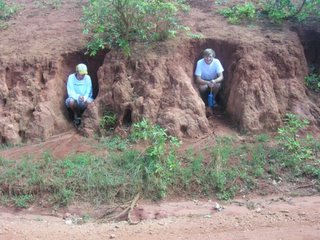
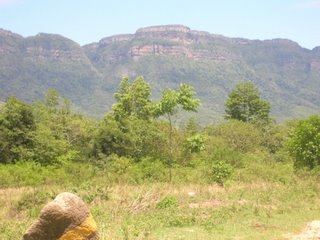
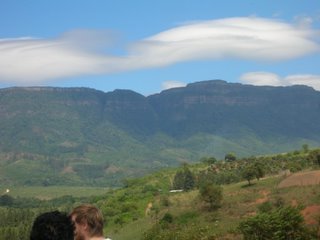


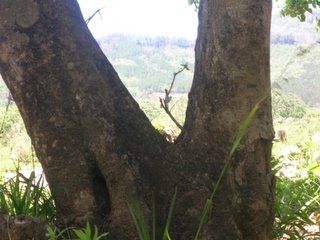


Eventually we headed back to the house to make lunch and start on Thanksgiving dinner. At one point all the women were preparing food while the men were outside chopping wood for the wood-burning stove. It would have made Laura Ingalls Wilder proud and my feminist counterparts hang their heads in shame.
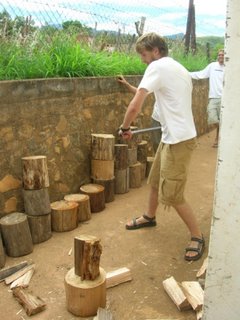
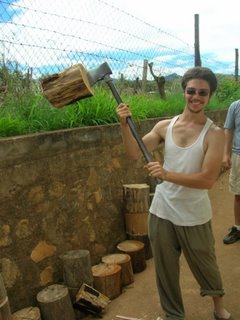 While the food was cooking a group of us went outside to play wiffle ball. We found a soccer field that could have easily fit into a stereotyped idea of a green meadow in The Sound of Music. We played a few innings and were inevitable joined by a large group of children.
While the food was cooking a group of us went outside to play wiffle ball. We found a soccer field that could have easily fit into a stereotyped idea of a green meadow in The Sound of Music. We played a few innings and were inevitable joined by a large group of children.
The children were hilarious. One was only wearing a pair of bright red underwear pulled way too high. He was an immense character. He may have been a wrestler in his former life. The boys soon had all the kids playing tag, arm wrestling, and playing wiffle ball. I was struck by the fact that I felt like I was in a descriptive article about Africa. My life is so different now, and incredible, and I feel I'm reminded every day.
Eventually we headed back inside for dinner. All of us crowded around a table loaded with turkey, stuffing, mashed potatoes, sweet potatoes, squash, etc. Once again we submitted to rounds of "I am thankful for..." which had the common theme of each other. Dinner was amazing and wonderful and we spent the rest of the evening snacking on desserts.
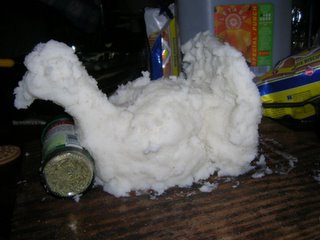
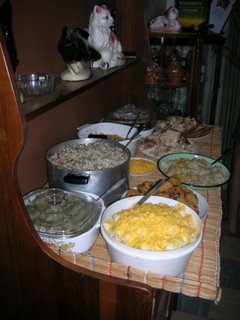
In the morning we got up and did the taxi ride home, our only real hindrance being the brief taxi break down in which we contemplated hiking or hitching but luckily didn't have to make that choice. When I got home, I feel into exhausted slumber as soon as I walked through my door but nevertheless was rejuvenated and happy.